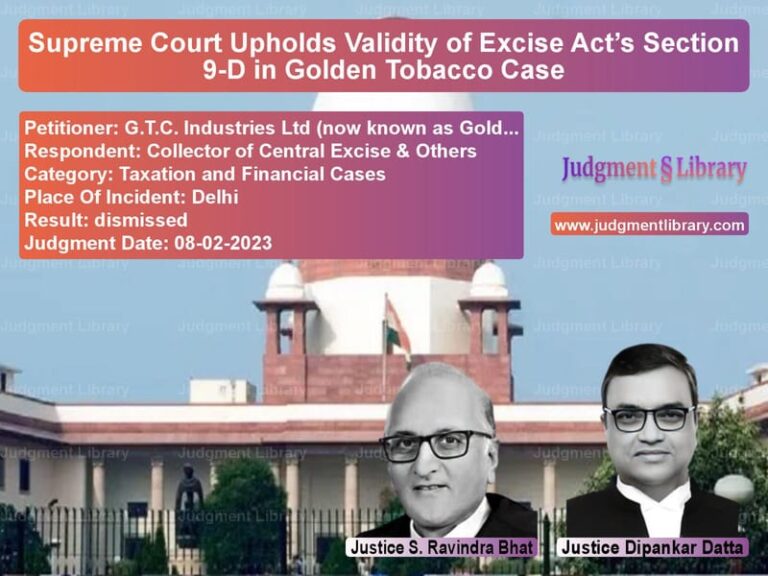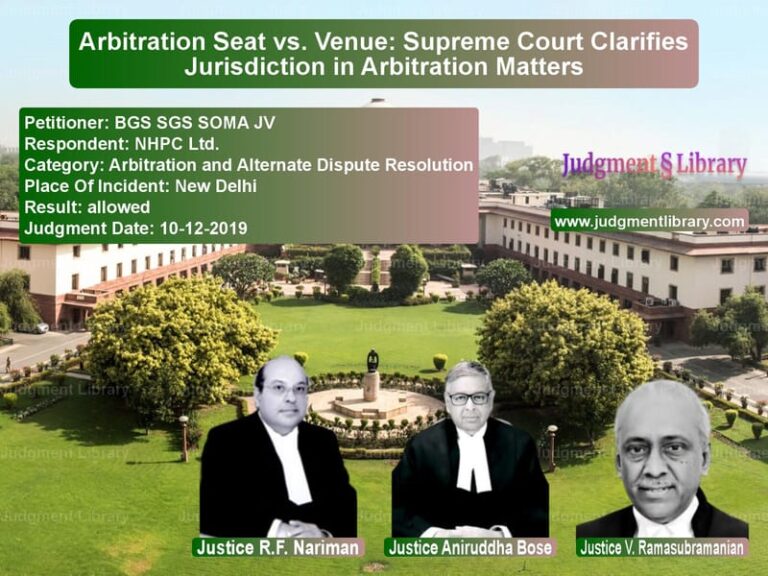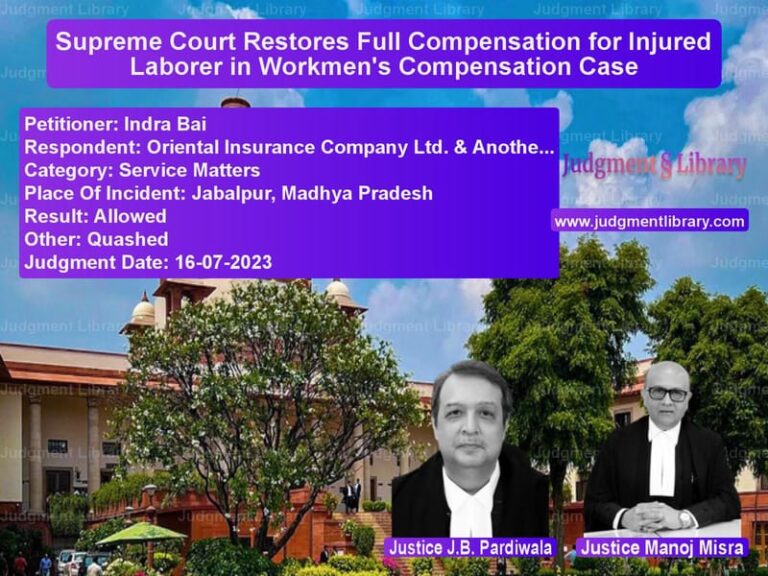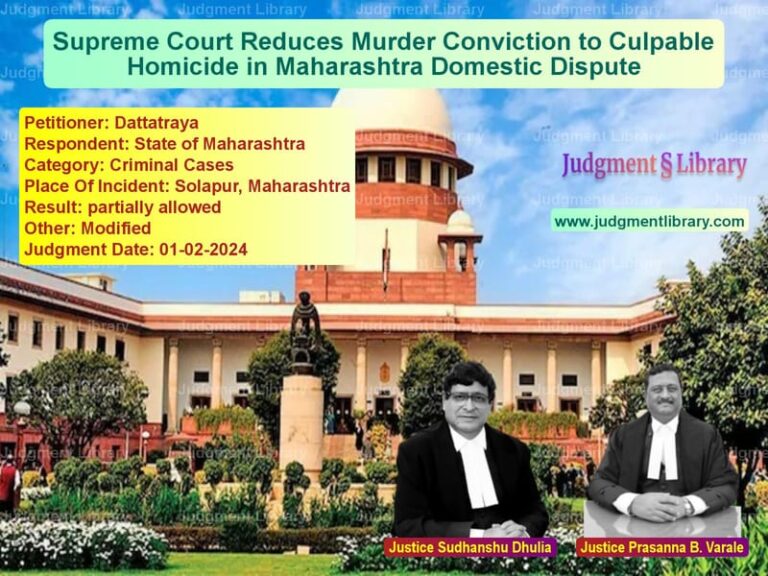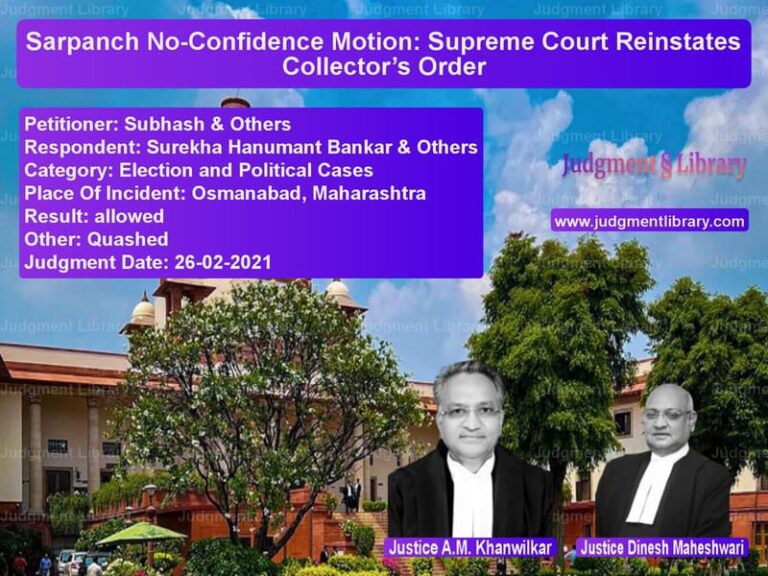Supreme Court Reduces Murder Conviction to Negligence in Policeman’s Accidental Shooting Case
The Supreme Court of India recently ruled in Arvind Kumar vs. State of NCT, Delhi, reducing a murder conviction to causing death by negligence under Section 304A of the Indian Penal Code (IPC). The case involved the accidental firing of a semi-automatic carbine by a police constable, leading to the death of a fellow officer. The ruling sheds light on how courts interpret criminal intent and negligence in firearm-related incidents.
Background of the Case
The appellant, Arvind Kumar, was convicted under Section 302 IPC (murder) for allegedly killing Constable Mohd. Rashid at the I.P. Estate Police Station, Delhi, on December 28, 1994. He was sentenced to life imprisonment by the Sessions Court, which held that his actions fell under the “thirdly” clause of Section 300 IPC. The High Court upheld the conviction.
However, the Supreme Court found that the shooting was accidental and modified the conviction to Section 304A IPC (causing death by negligence), significantly reducing the sentence.
Facts of the Case
According to the prosecution, the incident occurred at around 5:45 PM when Constable Rashid was on duty as “Munshi-Roznamacha” at the police station. He was talking on the official telephone when Sub-Inspector Shashi Bala (PW-12), the Duty Officer, asked him to end the call as it was keeping the line engaged.
Since Rashid did not comply, Shashi Bala asked Arvind Kumar, who was posted as a guard, to intervene. Arvind, carrying a Semi-Automatic Fire (SAF) Carbine, entered the duty room and put his hand on Rashid’s shoulder, requesting him to hang up.
The prosecution initially claimed that Rashid playfully pushed Arvind while holding his carbine, causing a scuffle. The SAF got entangled in a chain attached to Arvind’s belt, and five rounds were accidentally fired, hitting Rashid in the neck and killing him.
Initially, the police registered a case under Section 304A IPC (death by negligence). However, Rashid’s father later alleged that Arvind and Shashi Bala had a grudge against his son. He claimed that Rashid had caught them in an “objectionable position” and that they had threatened him. The case was then transferred to the Crime Branch, and the charges were upgraded to Section 302 IPC (murder).
Trial Court and High Court Convictions
- The Sessions Court convicted Arvind under Section 302 IPC, ruling that he had fired intentionally.
- The Punjab and Haryana High Court upheld the conviction, rejecting the defense of accidental firing.
- Arvind had already served 8 years and 11 months before being granted bail by the Supreme Court in 2017.
Key Legal Issues Before the Supreme Court
- Whether the shooting was intentional (murder) or accidental (negligence).
- Whether Arvind had the knowledge that his actions were likely to cause death.
- Whether the testimonies of Sub-Inspector Shashi Bala (PW-12) and CISF official Satbir Singh (PW-25) supported the prosecution’s case.
Arguments by the Appellant (Arvind Kumar)
The appellant’s counsel argued:
- The firing was purely accidental and occurred during a scuffle.
- There was no motive since the High Court itself rejected the theory of a prior grudge.
- The ballistic expert’s report did not rule out the possibility of an accidental discharge.
- Both eyewitnesses, Shashi Bala (PW-12) and Satbir Singh (PW-25), testified that it was an accident.
Arguments by the Respondent (State of NCT, Delhi)
The prosecution argued:
- Arvind was trained in handling firearms and should have known the consequences of using an SAF Carbine.
- The ballistic expert confirmed that a shot could not have been fired unless the trigger was pulled.
- Rashid’s father had alleged a prior threat to his son’s life.
Supreme Court’s Observations and Judgment
The Supreme Court, comprising Justices Abhay S. Oka and Rajesh Bindal, ruled in favor of Arvind, overturning the conviction under Section 302 IPC.
1. No Proof of Intent to Kill
The Court noted:
“The prosecution has failed to prove that the appellant had either the intention of causing the death of the deceased or the intention of causing such bodily injury that was likely to result in death.”
Read also: https://judgmentlibrary.com/supreme-court-acquits-man-in-ndps-case-due-to-procedural-lapses/
2. Eyewitnesses Supported the Defense
Both PW-12 (Shashi Bala) and PW-25 (Satbir Singh) testified that the gun fired accidentally. The Court observed:
“The version of PW-12 and PW-25 completely supports the defense of accidental firing.”
3. No Evidence of Premeditation
The Court ruled that there was no evidence to support premeditated murder, stating:
“There is no evidence to suggest that the appellant had any reason to intentionally kill the deceased.”
4. Ballistic Report Did Not Rule Out Accident
The Court found that the ballistic report did not conclusively prove intentional firing. It noted:
“The expert’s report does not rule out the possibility of an accidental discharge.”
Final Judgment
- The Supreme Court set aside the conviction under Section 302 IPC.
- Arvind was convicted under Section 304A IPC (causing death by negligence).
- Since he had already served more than 8 years (far exceeding the 2-year maximum sentence under Section 304A), his sentence was considered complete.
- His bail bonds were canceled, and his detention was no longer required.
Implications of the Judgment
- Clarifies legal distinction between negligence and intentional murder.
- Sets a precedent for cases involving accidental firearm discharges.
- Emphasizes importance of eyewitness testimony in determining intent.
The ruling serves as a reminder that criminal liability must be based on clear evidence of intent, and courts should carefully assess cases where negligence, rather than premeditated action, is at play.
Petitioner Name: Arvind Kumar.Respondent Name: State of NCT, Delhi.Judgment By: Justice Abhay S. Oka, Justice Rajesh Bindal.Place Of Incident: Delhi.Judgment Date: 16-07-2023.
Don’t miss out on the full details! Download the complete judgment in PDF format below and gain valuable insights instantly!
Download Judgment: arvind-kumar-vs-state-of-nct,-delhi-supreme-court-of-india-judgment-dated-16-07-2023.pdf
Directly Download Judgment: Directly download this Judgment
See all petitions in Murder Cases
See all petitions in Bail and Anticipatory Bail
See all petitions in Legal Malpractice
See all petitions in Judgment by Abhay S. Oka
See all petitions in Judgment by Rajesh Bindal
See all petitions in partially allowed
See all petitions in Modified
See all petitions in supreme court of India judgments July 2023
See all petitions in 2023 judgments
See all posts in Criminal Cases Category
See all allowed petitions in Criminal Cases Category
See all Dismissed petitions in Criminal Cases Category
See all partially allowed petitions in Criminal Cases Category



